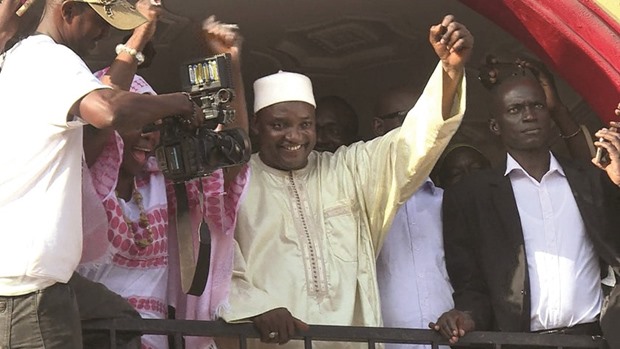The Gambia’s President-elect Adama Barrow was to hold talks with his coalition this weekend to plot his transition to power, following a shock election victory that ended the 22-year rule of Yahya Jammeh.
The scenes of jubilation on the streets after the results were released on Friday gave way to a calm but buoyant mood in the capital Banjul as horse-trading got under way behind closed doors.
Barrow was to meet with the seven opposition party leaders and one independent who make up the coalition team that propelled him to power on Thursday.
He will then hold talks with Ibn Chambas, the UN’s representative for west Africa, as expectation grows that he will put together for a reform-led administration which will reverse some the Jammeh regime’s policies that have isolated Gambia internationally.
Barrow has pledged to rejoin the International Criminal Court and the Commonwealth, both institutions which Jammeh railed against and withdrew the country from, to the dismay of many.
Jammeh has 60 days to leave office, according to the constitution, but has promised that Barrow will take over in January.
The strongman’s whereabouts are currently unknown after Gambian television broadcast an unexpected statement to the nation promising to step down in line with voters’ wishes.
Jammeh congratulated Barrow late on Friday for his “clear victory” in a jovial conversation that saw him joking about becoming a farmer in his hometown, with the exchange caught on film and broadcast.
It was a shock for many to see the strongman, who had promised to bury critics “nine feet deep” and whose regime has prosecuted peaceful protesters, calmly accept defeat.
As a result, few believed he would allow himself to lose Thursday’s vote against Barrow.
Entrenched rulers such as Jammeh rarely lose elections in Africa so the result came as a shock, particularly given that other African leaders have since last year changed their country’s constitutions to prolong their rule.
Official results in the West African country of 1.8mn gave Barrow, a real estate developer who once worked as a security guard at retailer Argos in London, 45.5% of the vote against Jammeh’s 36.7%.
After late-night victory parties held by many Gambians to celebrate Jammeh’s departure, life was returning to normal.
Sulayman Drammeh, a dock worker, summed up the mood: “We are very happy.”
“Twenty-two years is enough,” he told AFP at a Banjul market. “That’s why Africa has a problem – if you come to power, you don’t want to move. We are all Gambians, so let’s come together to work.”
“I feel different and when we woke up people were happy. How we are free to say everything we want to say,” said Yacouba Cisse, 34, a fisherman who was still wearing a pink whistle from overnight celebrations in the capital.
A van packed with opposition supporters banging drums rolled through the streets yesterday and many people were still wearing opposition coalition T-shirts from the night before.
Despite a heavy police presence there were few signs of tension or hostility, witnesses said.
“I will only believe it (Jammeh’s defeat) when I see him leaving state house. He still controls the army and his family are the top brass,” said a businessman, who asked not to be named.
The coalition will govern for three years with Barrow as its figurehead, after which elections will be held and he will step down in line with a memorandum signed by all the parties involved.
Greeting UN officials and working with the European Union on development plans will be a completely new experience for Barrow, a political novice who until Friday had never held office or even held a senior role within a political party.
Businessman Barrow was chosen as the opposition flag bearer by a group of political parties who joined forces for the first time and won unprecedented popular support.
Yesterday Barrow held meetings at his house as supporters gathered outside, witnesses said.
Expectations are high among his supporters for an end to human rights abuses and for job creation.
“We expect him to remedy the ‘back way’. We want him to create jobs for youths. Most of us are frustrated,” said farmer Harouma Diallo, 29.
The “back way” is a Gambian description of the route illegal migrants take from the country to Europe.
So far, the international community appears keen to work with the new administration after what diplomats have characterised as Jammeh’s provocative statements, disregard for protocol and tendency to change his mind without warning.
The White House, UN, African Union and regional body ECOWAS have all hailed Jammeh’s respectful acceptance of the result and pledge to leave office.

This video grab taken from footage shot by AFPTV shows Barrow gesturing to the crowd in Kololi following his victory in the polls.
